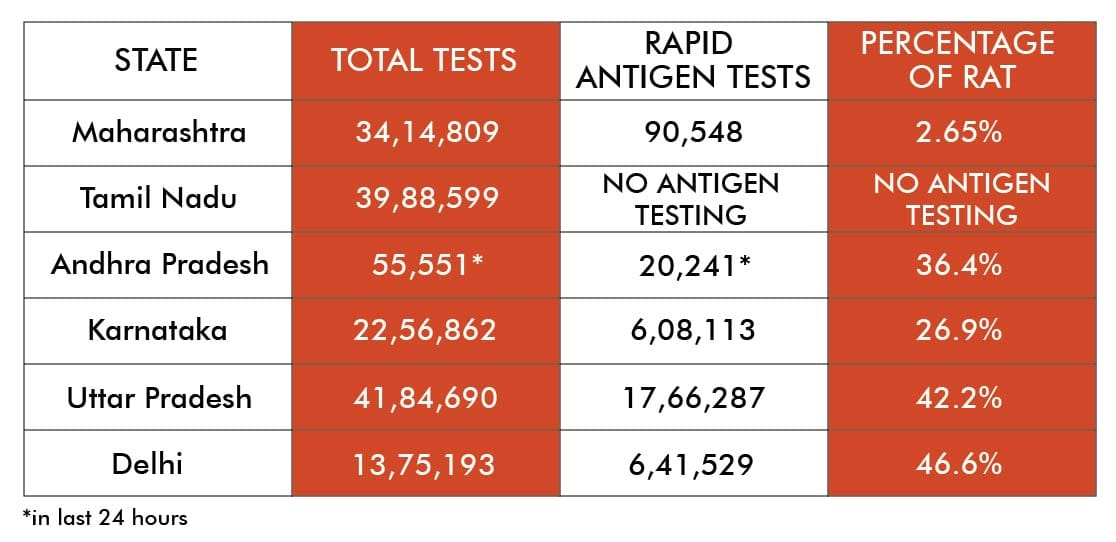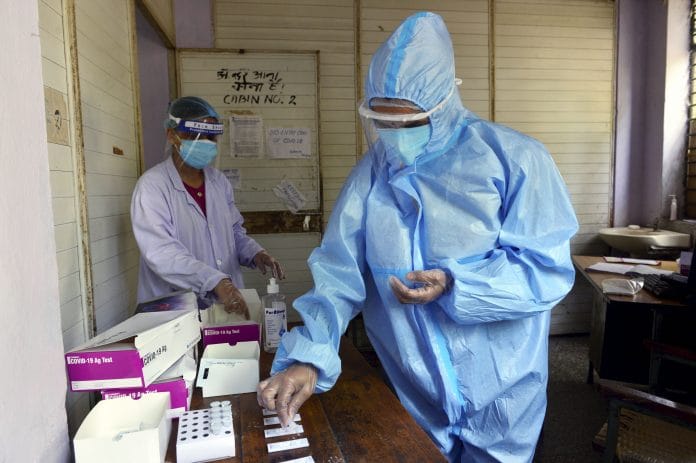New Delhi: Delhi, which has seen its Covid testing numbers improve drastically since July, has, however, been receiving flak for focusing its testing strategy on rapid antigen tests (RAT) instead of the gold standard real-time polymerase chain reaction (RT-PCR) test.
Data analysed by ThePrint showed that in comparison to the five high burden states — Maharashtra, Tamil Nadu, Andhra Pradesh, Karnataka and Uttar Pradesh — Delhi is conducting a higher proportion of antigen tests than RT-PCR tests. In terms of cumulative cases, Delhi ranks sixth.
Data from the government health bulletins analysed by ThePrint reveals that in the period between 30 June (when data on both kinds of tests was first made available) to 20 August, Delhi has conducted almost double the RATs than RT-PCR tests — 6,41,529 RATs against the 3,28,300 RT-PCR tests.
The Indian Council of Medical Research (ICMR), had on 14 June, approved RAT for containment zones and hospital settings in order to facilitate quick diagnosis. If a RAT test comes positive, a patient is immediately processed as a Covid case. However, if a RAT test comes negative for a symptomatic patient, the sample needs to be reconfirmed through a RT-PCR test.
This is because the specificity of the antigen test ranges from 99.3 to 100 per cent while its sensitivity ranges from 50.6 to 84 per cent.
The Delhi High Court on 19 August, took note of cases fluctuating by an average of 1,300 a day in the capital and said that while testing through RAT has steadily increased, the number of RT-PCR tests have not.
This comes at a time when Delhi, which had seen an encouraging decline in coronavirus cases in July, noted an uptick in cases in August.
ThePrint reported that cases had surged in the week between 5 August and 11 August and remained above 1,000 after dropping to 674 on 4 August. Since then, Delhi has continued to note fluctuations in cases in the week of 12-20 August.
As of 20 August, Delhi recorded a total of 1,57,354 cases, with 4,257 deaths and 1,41,826 recoveries.
ThePrint reached Director General Health Services, Nutan Mundeja, Health Secretary Padmini Singhla and Health Minister Satyender Jain via calls and WhatsApp messages, but received no response until the time of publishing this report.
Also read: Why India’s rapid antigen tests for coronavirus are like ‘flipping a coin’
How Delhi compares to top 5 high-burden states
Delhi, which was among the top five high burden states until Uttar Pradesh displaced it in the past week, has been conducting a higher proportion of rapid antigen tests than RT-PCR tests when compared to these states.

In Maharashtra, which can easily be called the country’s ‘Covid capital’, data shared by officials from the state’s Covid war room revealed that rapid antigen testing does not make up for even half of the total tests being conducted.
According to the Maharashtra health bulletin on 20 August, 34,14,809 tests had been conducted so far. Of this, only 90,548 were RATs after the state started antigen testing on 7 July.
Tamil Nadu, which has the second highest caseload in the country, has not been using rapid antigen tests at all. As of 20 August, the state had conducted 39,88,599, all RT-PCR tests, according to the health bulletins released.
In neighbouring Andhra Pradesh, which has the third highest caseload, the state bulletin showed that a total of 55,551 tests had been conducted as of 20 August, of which 20,241 were rapid antigen tests.
Karnataka conducted 6,08,113 rapid antigen tests of the total 22,56,862 tests conducted as of August 20. The remaining tests have been a combination of RT-PCR, CBNAT and TrueNat tests.
In Uttar Pradesh, which has emerged as the highest tester among the high burden states, data shared by officials in the health department showed that of the total 41,84,690 tests done as of 20 August, 17,66,287 have been RATs while the remaining have been a combination of RTPCR, CBNAT and TrueNat tests.
Also read: Low testing, delayed results, opaque data: Noida, Ghaziabad face questions on Covid handling
RAT versus RT-PCR tests
The Delhi High Court in July rapped the government for expending less than 50 per cent of its RT-PCR testing capacity. A government report submitted in court revealed that nearly 18 per cent of rapid antigen tests sent for follow-up RT-PCR tests had come back positive, highlighting concerns over the government’s focus on rapid antigen tests.
Then, on 19 August, on the basis of a status report filed by the Delhi government, the court noted that RT-PCR tests have not increased in the same proportion as antigen tests.
According to the order copy, accessed by ThePrint, the court noted that in the period between 31 July and 17 August, while the number of rapid antigen tests virtually doubled, RT-PCR testing remained at an average of less than 5,000 a day.
Pointing to the fluctuations in daily cases in August, the court said it showed that “there should be a concentrated focus on ramping up of lab testing in Delhi”.
The Aam Aadmi Party government, however, has praised its ‘Delhi model’, stating that due to its testing strategy, there had been a large drop in positivity rate of both RT-PCR as well as RATs.
Experts ThePrint spoke to said that while rapid antigen tests lag behind RT-PCR tests, ramping up testing is key to getting a better picture of the pandemic.
“While we would prefer more RT-PCR tests, a combination of the two also works because this is a strategic decision to not overload the system with RT-PCR tests, which takes longer. If we wait for RT-PCR tests, then we may lose crucial time to take key decisions,” said Preeti Kumar, vice-president for health systems support, Public Health Foundation of India.
Dr Sanjay Rai, professor, community medicine, AIIMS, also pointed out that the recent sero survey showed Delhi is already in the widespread transmission phase, and a combined testing strategy would be a more efficient use of resources.
“The fluctuations in cases is not wide so it’s not a cause of concern. Testing focus on rapid antigen testing is working well now. Focusing on too many RT-PCR tests will only lead to wasteful expenditure,” he said.
Also read: After month-long downward Covid trend, Delhi sees worrying rise in cases, hospitalisations






